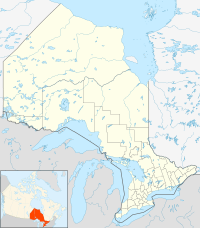Assabaska facts for kids
Quick facts for kids
Assabaska
|
|
|---|---|
| Assabaska Indian Reserve | |
| Country | Canada |
| Province | Ontario |
| District | Rainy River |
| First Nations | Big Grassy, Onigaming |
| Area | |
| • Land | 8.71 km2 (3.36 sq mi) |
| Population
(2021)
|
|
| • Total | 0 |
Assabaska is a special piece of land, called an Indian reserve, located in northwestern Ontario, Canada. It sits right on the beautiful Lake of the Woods. This land is shared by two important First Nations communities: the Big Grassy First Nation and the Ojibways of Onigaming First Nation.
The Assabaska reserve was officially created in 1999. This happened as part of an agreement to settle a long-standing land claim.
Contents
A Look Back: Assabaska's History
Why Was Assabaska Created?
The land that is now the Assabaska reserve was meant to be a special area for the Assabaska First Nation a long time ago. This was agreed upon in 1873, as part of an important agreement called Treaty 3. Treaties are like big promises between governments and First Nations.
However, this land was never properly measured or set aside. Because of mistakes and a lack of communication, the reserve was never officially made. In 1958, the land was moved from federal government control to the provincial government.
From Park to Reserve Land
Later, in 1967, these lands became part of the Lake of the Woods Provincial Park. This park had a campground that was not making money. It actually lost thousands of dollars each year.
The First Nations communities, Mishkosiiniiziibing (now known as Big Grassy River) and the Ojibways of Onigaming (who are the successors to the Assabaska First Nation), worked hard to get their land back. In 1977, they officially filed a land claim. This means they asked the government to recognize their rights to the land.
The Land Claim Settlement
After many years, the land claim was finally settled in the late 1990s. As part of this agreement, the mainland part of the provincial park was changed. It stopped being a provincial park and became the Assabaska Reserve.
Today, it is still used as a campground. It is now known as the Assabaska Ojibway Heritage Park. This park helps to share the rich history and culture of the Ojibway people.
 | Roy Wilkins |
 | John Lewis |
 | Linda Carol Brown |


